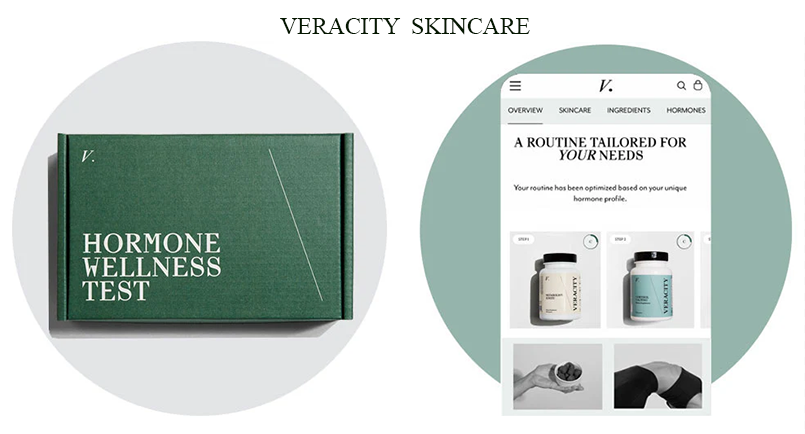
Hyperpigmentation—those stubborn dark spots that seem to stick around no matter what—is a common concern for many women. While there are a few culprits, hormones often play a leading role in why some women are more prone to developing dark spots than others. By understanding how hormones affect your skin, you can take targeted steps to manage hyperpigmentation and support a clearer, more even complexion.
Contents
What is Hyperpigmentation?
Hyperpigmentation occurs when certain areas of the skin produce more melanin than usual. Melanin is the pigment responsible for the color of your skin, hair, and eyes. When it gathers in concentrated spots, it can create dark patches or spots on the skin, which are often difficult to fade.
Types of Hyperpigmentation
Not all hyperpigmentation is the same. Here are the main types:
- Melasma: Often caused by hormonal changes, melasma appears as larger patches of darkened skin, typically on the face.
- Post-inflammatory hyperpigmentation (PIH): This occurs after skin inflammation or injury, like acne or eczema, and leaves dark marks after healing.
- Sunspots: Caused by sun exposure, these are small, darkened spots that usually appear on areas frequently exposed to the sun, like the face and hands.
While sun exposure can worsen any type of hyperpigmentation, hormonal fluctuations are a significant factor, especially for women experiencing melasma.
How Hormones Trigger Hyperpigmentation
Hormones can have a powerful impact on skin, particularly when it comes to pigment production. Estrogen and progesterone, the primary female hormones, are the biggest influences here. These hormones can stimulate melanin-producing cells (melanocytes) to produce more pigment, leading to dark spots.
The Estrogen Connection
Estrogen helps regulate melanin production. When estrogen levels are high or fluctuating, as they often are during pregnancy or with hormonal contraceptives, melanocytes are more active, leading to an increased risk of hyperpigmentation.
Estrogen’s effect on melanin is why melasma, also called the “mask of pregnancy,” commonly appears in pregnant women. Higher levels of estrogen can make the skin more reactive to sunlight, which further stimulates pigment production.
Progesterone’s Role
Progesterone also influences melanin production, though in a slightly different way than estrogen. It’s believed that progesterone can increase the skin’s sensitivity to factors that trigger hyperpigmentation, such as UV exposure or skin inflammation.
Why Some Women Are More Prone Than Others
Not all women experience hormone-related hyperpigmentation, so what makes some women more prone than others? The answer often comes down to genetics, lifestyle, and individual hormone levels.
Genetics and Family History
If your mother or grandmother experienced hyperpigmentation, you might have a higher risk as well. Genetics can determine how your skin reacts to hormones and how sensitive it is to pigmentation changes.
Hormonal Imbalances and Conditions
Some women have underlying hormonal imbalances or conditions, like polycystic ovary syndrome (PCOS), which can increase susceptibility to hyperpigmentation. Conditions that impact hormone levels can lead to greater fluctuation in melanin production, increasing the chance of dark spots.
Lifestyle and Environmental Factors
Hormones alone don’t tell the whole story. Lifestyle factors, particularly sun exposure, play a huge role. Even small amounts of UV exposure can exacerbate hormone-related pigmentation. Stress, lack of sleep, and poor diet can also impact hormone balance, potentially increasing the risk of hyperpigmentation.
Managing Hormone-Related Hyperpigmentation
While you can’t control all hormonal fluctuations, there are effective strategies to manage hyperpigmentation caused by hormones. Here are some tips for minimizing and treating those stubborn dark spots.
Sun Protection is Essential
Hormone-related pigmentation is highly photosensitive, meaning it’s easily worsened by sun exposure. To prevent hyperpigmentation from getting darker, always use broad-spectrum sunscreen with an SPF of 30 or higher.
- Daily Application: Apply sunscreen every morning, even on cloudy days, as UV rays penetrate through clouds and glass.
- Protective Accessories: Use hats, sunglasses, and seek shade when spending extended time outdoors to protect your skin from direct sunlight.
Consider Hormone-Balancing Approaches
For some women, balancing hormones can help manage hyperpigmentation. This could include lifestyle changes, dietary adjustments, or supplements, though these should always be discussed with a healthcare provider first.
Maintaining a balanced diet rich in antioxidants, managing stress, and getting enough sleep can positively impact hormone levels, reducing the risk of new pigmentation issues.
Top Ingredients for Treating Hormonal Hyperpigmentation
In addition to lifestyle changes, using targeted skincare products can help fade existing dark spots. Here are some of the best ingredients to look for:
Vitamin C
Vitamin C is a potent antioxidant that brightens skin and reduces hyperpigmentation. It inhibits melanin production, making it effective for fading dark spots. Apply a vitamin C serum in the morning to boost skin radiance and protect against UV-induced pigmentation.
Niacinamide
Niacinamide, or vitamin B3, is excellent for treating pigmentation. It reduces the transfer of melanin to skin cells, lightening dark spots over time. Niacinamide is also gentle on the skin, making it suitable for daily use.
Azelaic Acid
Azelaic acid is another effective ingredient for hyperpigmentation. It has anti-inflammatory properties, making it a great option for post-inflammatory hyperpigmentation and melasma. Azelaic acid can be used once or twice daily, depending on your skin’s tolerance.
Retinoids
Retinoids speed up cell turnover, helping to fade pigmentation more quickly. They stimulate new skin cell growth, which can improve overall skin tone and texture. Retinoids can be strong, so start with a lower concentration or use every other night if your skin is sensitive.
When to Seek Professional Help
If hyperpigmentation persists or worsens despite using skincare products and sun protection, consider seeking help from a dermatologist. There are several treatments that can specifically target hormone-induced hyperpigmentation:
- Chemical Peels: These can remove the top layer of skin, lightening pigmentation and smoothing texture.
- Laser Therapy: Laser treatments target pigmented areas with focused light, breaking up excess melanin in the skin.
- Microneedling: Microneedling can stimulate collagen production, helping to improve skin tone and texture over time.
Always discuss options with a skincare professional to ensure treatments are appropriate for your skin type and hyperpigmentation type.
Embracing Skin Changes
Hormone-related hyperpigmentation can feel frustrating, but understanding the reasons behind it can make all the difference. With the right mix of sun protection, skincare, and hormone-balancing habits, you can manage and even reduce dark spots over time. Remember, patience is key, and each small step you take brings you closer to healthier, more radiant skin.

